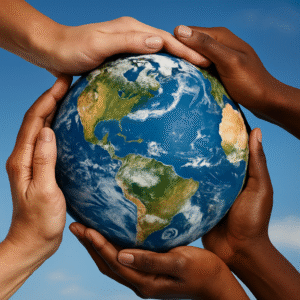Belief in Conflict: Understanding the Role of Faith and Conviction in Human Struggles

Diverse hands encircling the globe in unity
Throughout history, belief systems have been among the most powerful forces shaping societies, inspiring movements, and — at times — fueling conflicts. From religious wars to ideological confrontations and even scientific debates, belief often lies at the heart of tension and transformation. But what makes belief so potent, and why does it so frequently lead to conflict?
This article explores the role of belief in conflict — whether religious, political, cultural, or personal — and reflects on how belief can also serve as a bridge to understanding, healing, and peace.
The Nature of Belief
Belief is more than just acceptance of certain ideas; it’s the emotional and cognitive framework through which individuals interpret reality. Beliefs are shaped by upbringing, culture, education, and personal experiences, and they form the basis of identity. They influence how people think, behave, and relate to others.
When people feel their beliefs are challenged or invalidated, the reaction can be visceral. This deep emotional connection explains why belief is both a source of strength and a point of vulnerability in human interactions.
Historical Examples of Belief in Conflict

Religious war example: Siege of Jerusalem, 1099
-
Religious Conflicts: From the Crusades to modern-day tensions in the Middle East, religious belief has both unified and divided societies.
-
Political Ideologies: The Cold War, driven by capitalism versus communism, was a decades-long ideological standoff.
-
Cultural Clashes: Ethnic cleansing and systemic racism have often been justified by belief in cultural or racial superiority.
Belief and the Psychology of Conflict
Beliefs provide structure and meaning. However, when challenged, people experience cognitive dissonance — discomfort that leads them to reject new information. This deepens polarization and causes people to double down on their views.
In-group/out-group dynamics reinforce division, leading individuals to favor those with similar beliefs and distrust outsiders.
Modern-Day Belief Conflicts
Modern conflict over belief: Political tension in the U.S.
-
Misinformation and Conspiracy Theories: Events like the January 6 U.S. Capitol riot show how unverified beliefs can incite violence.
-
Science vs. Skepticism: Climate change denial and vaccine resistance stem from mistrust in science.
-
Identity Politics: Heated debates over gender, race, and nationalism reflect personal and cultural belief clashes.
When Belief Heals Instead of Hurts
Interfaith gatherings can build bridges across belief systems
Belief can be a source of peace and healing:
-
South Africa’s Truth and Reconciliation Commission used shared belief in justice and humanity to address the wounds of apartheid.
-
Interfaith Dialogues bring together people from diverse religions to promote mutual respect.
-
Spiritual Resilience through prayer, meditation, and belief-based counseling supports mental well-being during crises.
Reframing Belief in Conflict Resolution
-
Promote Empathy: Understand the experiences behind others’ beliefs.
-
Acknowledge Complexity: Realize that conflicts often go deeper than surface-level ideologies.
-
Focus on Shared Values: Values like justice, safety, and family can unite differing belief systems.
-
Educate for Tolerance: Equip people with tools to think critically and relate cross-culturally.
“Peace is not the absence of conflict, but the presence of understanding.”
A peaceful sunrise symbolizes new beginnings through understanding
Let belief be a force for connection, not destruction. By engaging others with humility and curiosity, we can move toward a future where beliefs — even when different — are not threats but opportunities for growth and peace.